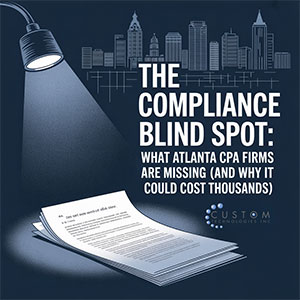 You’re a CPA. You double-check everything. You file early. You know GLBA and IRS Pub 4557 like the back of your hand. But here’s the hard truth: even the most meticulous firms in Metro Atlanta are missing one key thing — compliance coverage that actually matches today’s enforcement standards.
You’re a CPA. You double-check everything. You file early. You know GLBA and IRS Pub 4557 like the back of your hand. But here’s the hard truth: even the most meticulous firms in Metro Atlanta are missing one key thing — compliance coverage that actually matches today’s enforcement standards.
In 2025, assuming you're compliant just because you’re cautious isn’t enough. Regulatory agencies aren’t just going after large corporations anymore — they’re tightening the screws on small and midsized firms, especially those handling sensitive financial or health data.
What’s At Risk for CPA Firms in Metro Atlanta?
More than just fines.
Firms like yours are fiduciaries. A data breach or audit violation isn’t just a regulatory hit — it’s a threat to your reputation, your license, and your clients’ trust.
We’ve seen fines ranging from $5,000 to over $250,000. Worse? Losing clients who trusted you to protect their data.
Let’s break down the compliance risks Atlanta CPA firms face right now — and what you can do to protect your practice.
🚨 1. HIPAA Isn’t Just for Doctors
If your firm consults for medical practices, handles employee benefit audits, or reviews PHI-related documentation, HIPAA applies. The latest updates require:
- Encryption of all electronic PHI
- Regular vulnerability scans and risk assessments
- Employee cybersecurity training
- Breach response plans
💡 In 2024, a small provider in Georgia was fined $1.5 million for failing to encrypt their files. Don’t assume you're exempt just because you’re not a clinic.
💳 2. PCI DSS: If You Accept Credit Cards, You’re On the Hook
Do you take card payments for services or events? Then PCI DSS is your business too.
Key mandates include:
- Secure data storage
- Regular network monitoring
- Encrypted payment systems
- Restricted internal access to payment info
Fines for noncompliance range from $5K to $100K per month, and credit card processors may pull your ability to accept payments altogether.
🛡 3. The FTC Safeguards Rule: Think Financial Data, Not Just Health
Even if you’re not touching health records, if you handle personal financial info — think tax returns, investment data, or loan documentation — the FTC Safeguards Rule applies.
You must:
- Have a written info security plan
- Appoint a qualified person to manage IT risk
- Use MFA and encryption
- Conduct ongoing risk assessments
Failing this can cost $100,000 per incident for the business — and $10,000 personally for the managing partner.
Real Stories, Real Penalties
A small local CPA who partnered with a healthcare audit client suffered a ransomware attack. Why? Their backups weren’t encrypted. The result?
- $250,000 in federal penalties
- Dozens of clients lost
- IRS scrutiny for the next three years
Compliance isn't optional. It's a shield.
✅ Five Steps to Regain Control
If this feels overwhelming, you’re not alone. But you can stay ahead — here’s how:
- Run a Risk Assessment: Know where your systems fall short before the auditors do.
- Get Secure: Enforce MFA, encryption, and endpoint protection across all devices.
- Train Your Team: Staff should know how to spot phishing, protect credentials, and respond to incidents.
- Create a Breach Response Plan: Know who does what when something goes wrong.
- Partner With an Expert: We specialize in compliance support for CPA firms in Atlanta — and we speak your language.
🛡 Ready for Peace of Mind?
You’ve worked too hard to let a compliance gap put it all at risk.
Let us help you verify your safeguards, close compliance gaps, and give you confidence before the IRS, FTC, or your clients ever come knocking.
🎯 Book your FREE Network Compliance Assessment now.
It’s simple, no pressure, and it might save you thousands.



